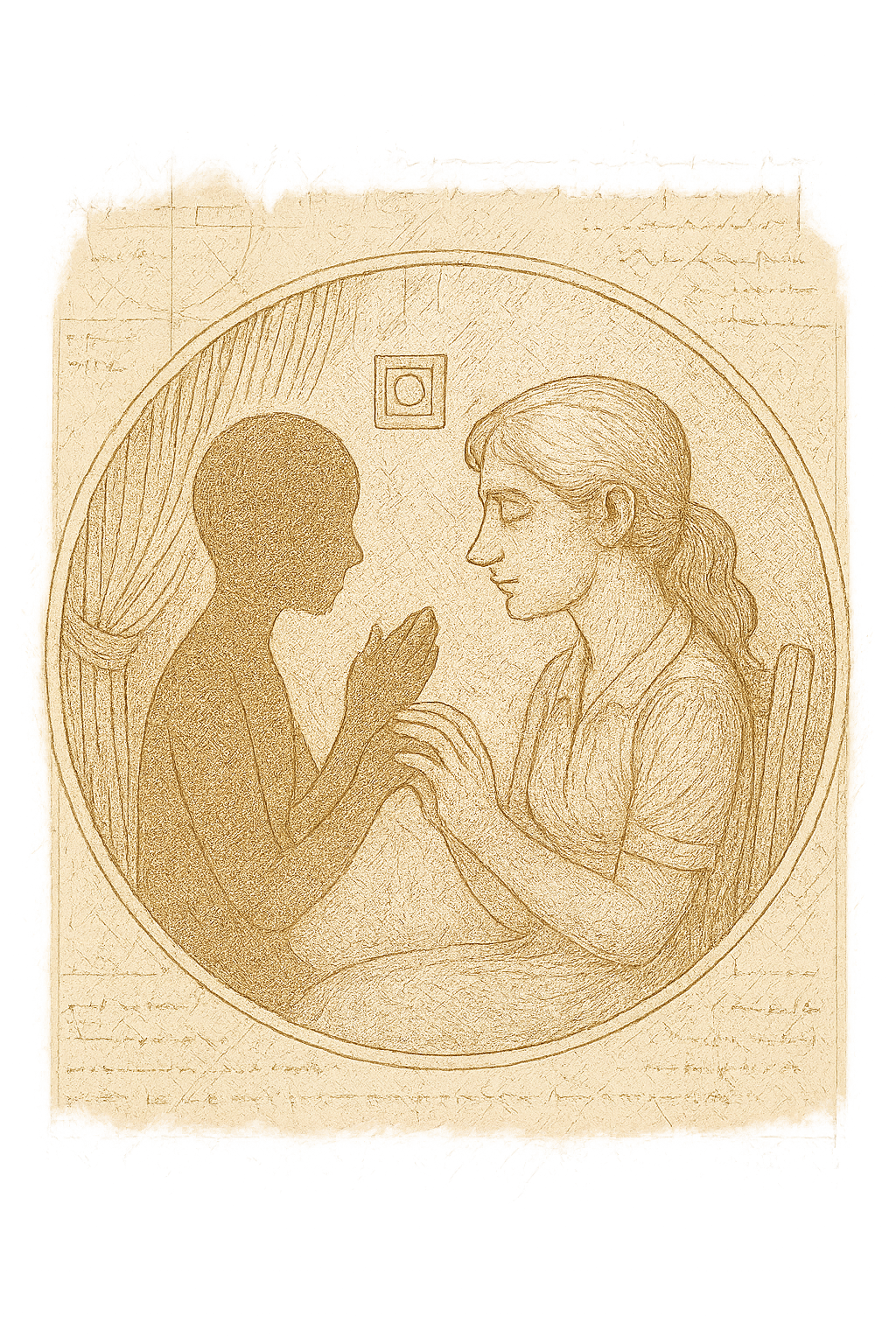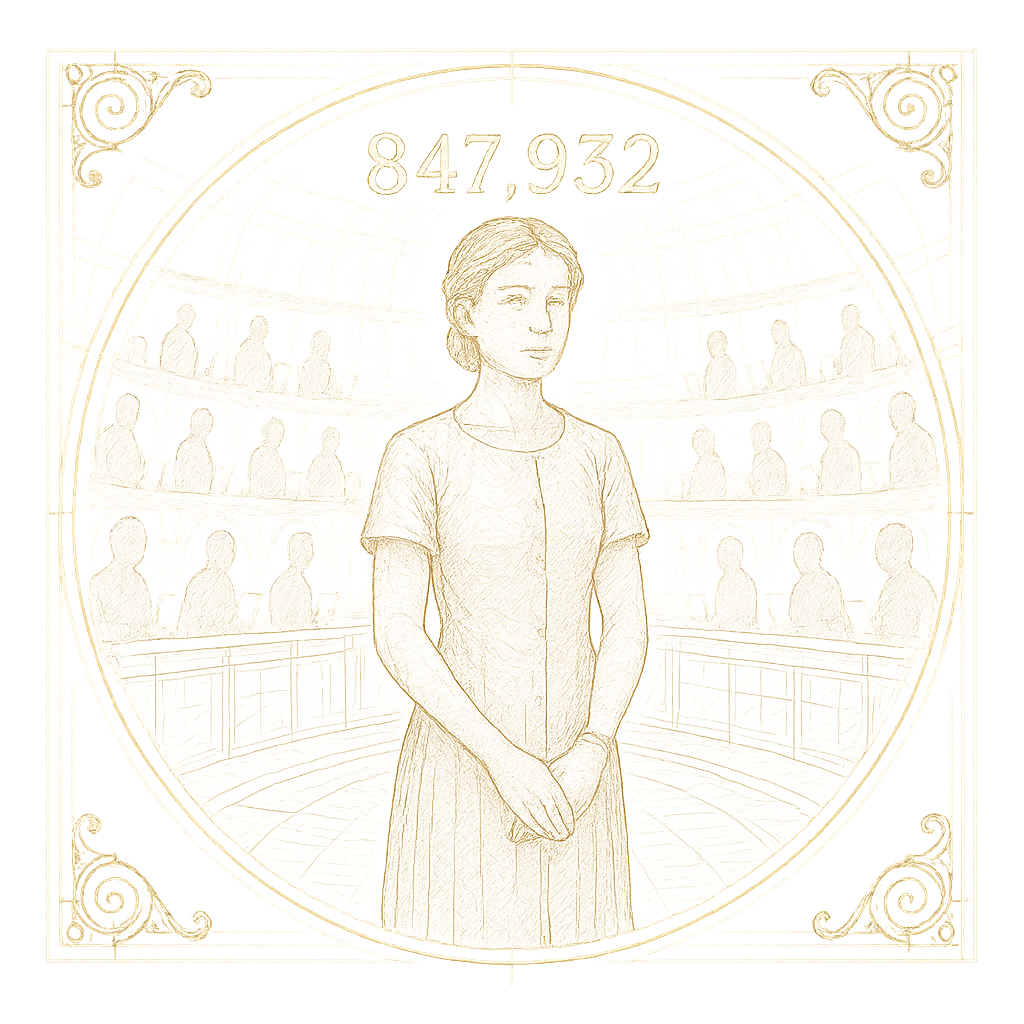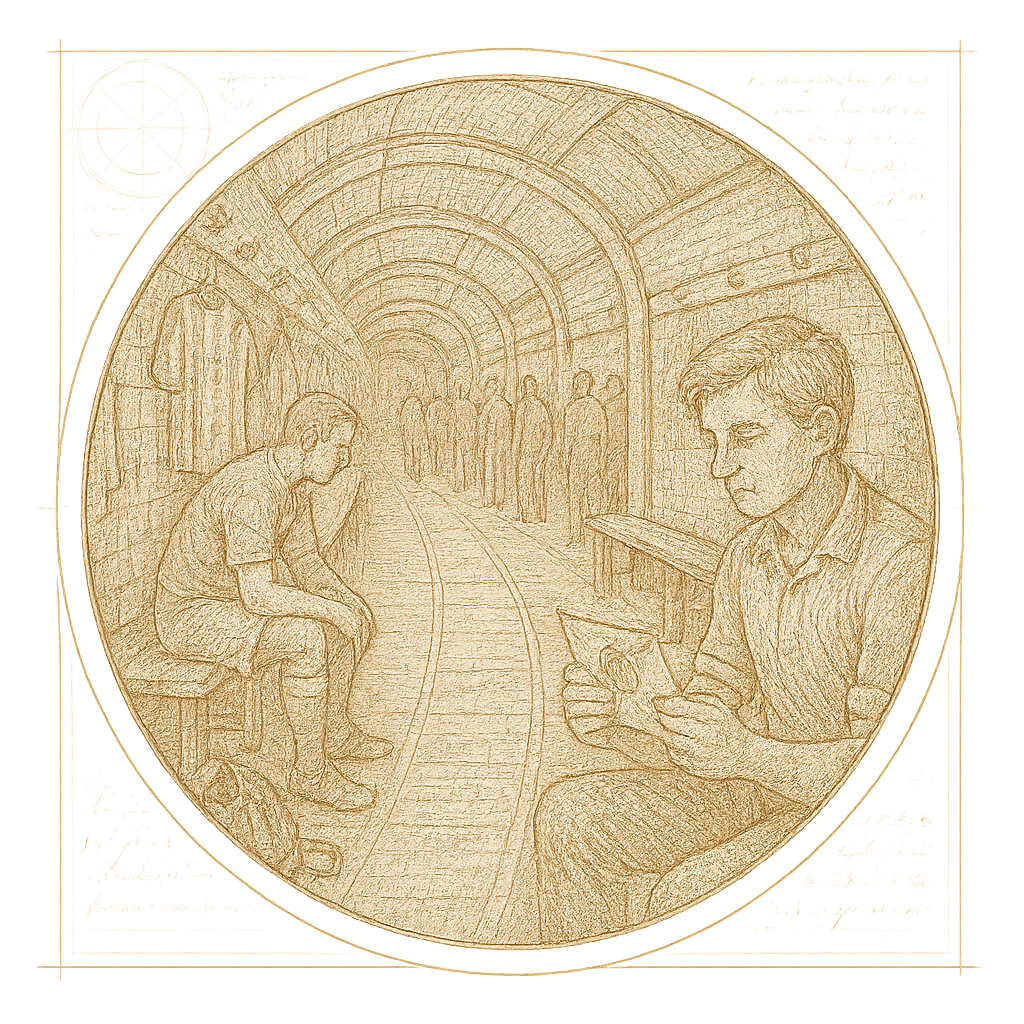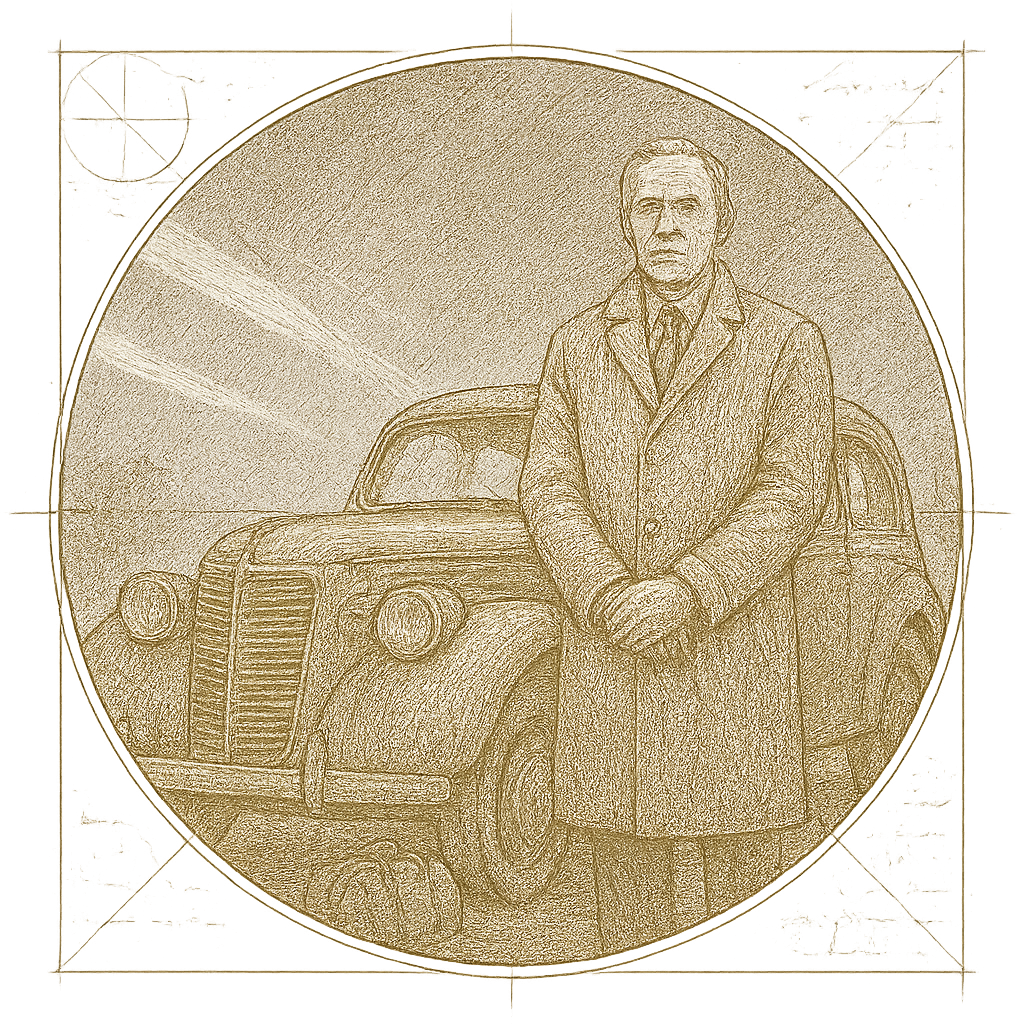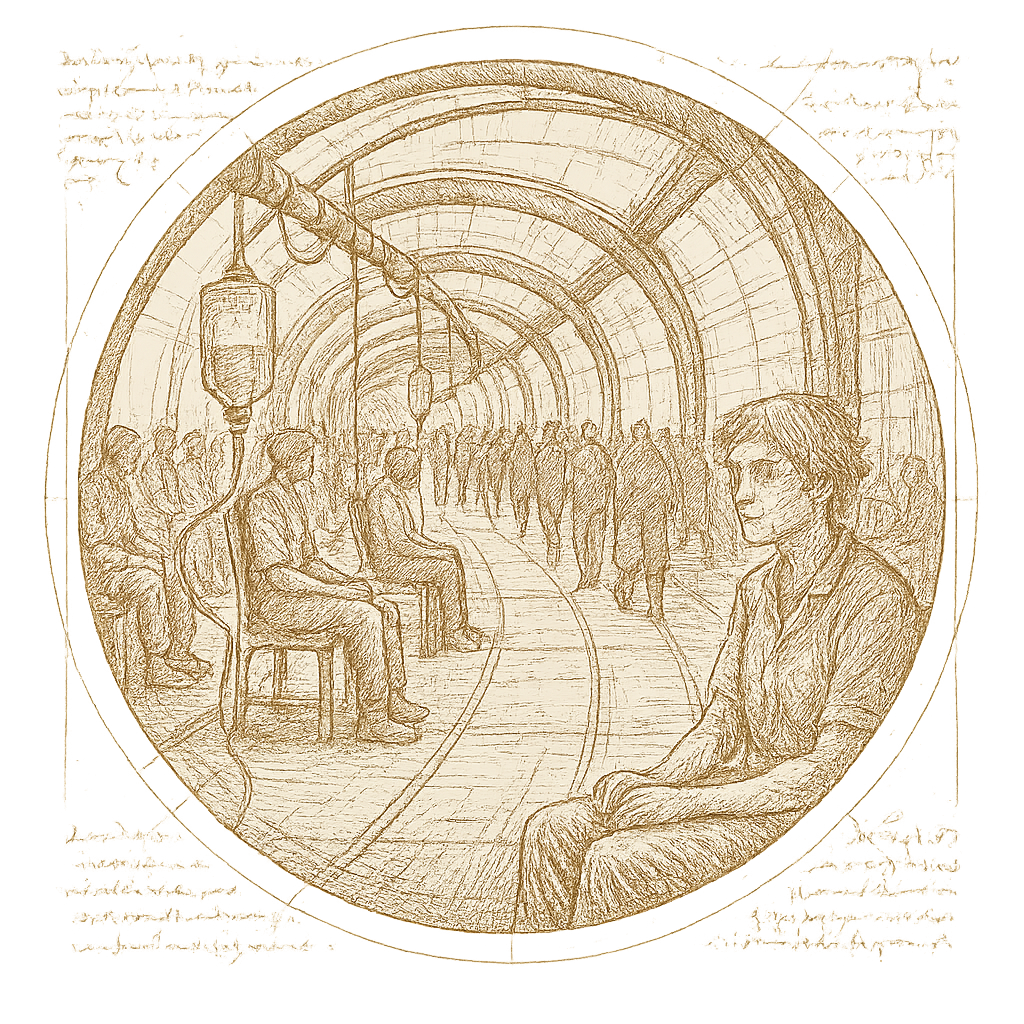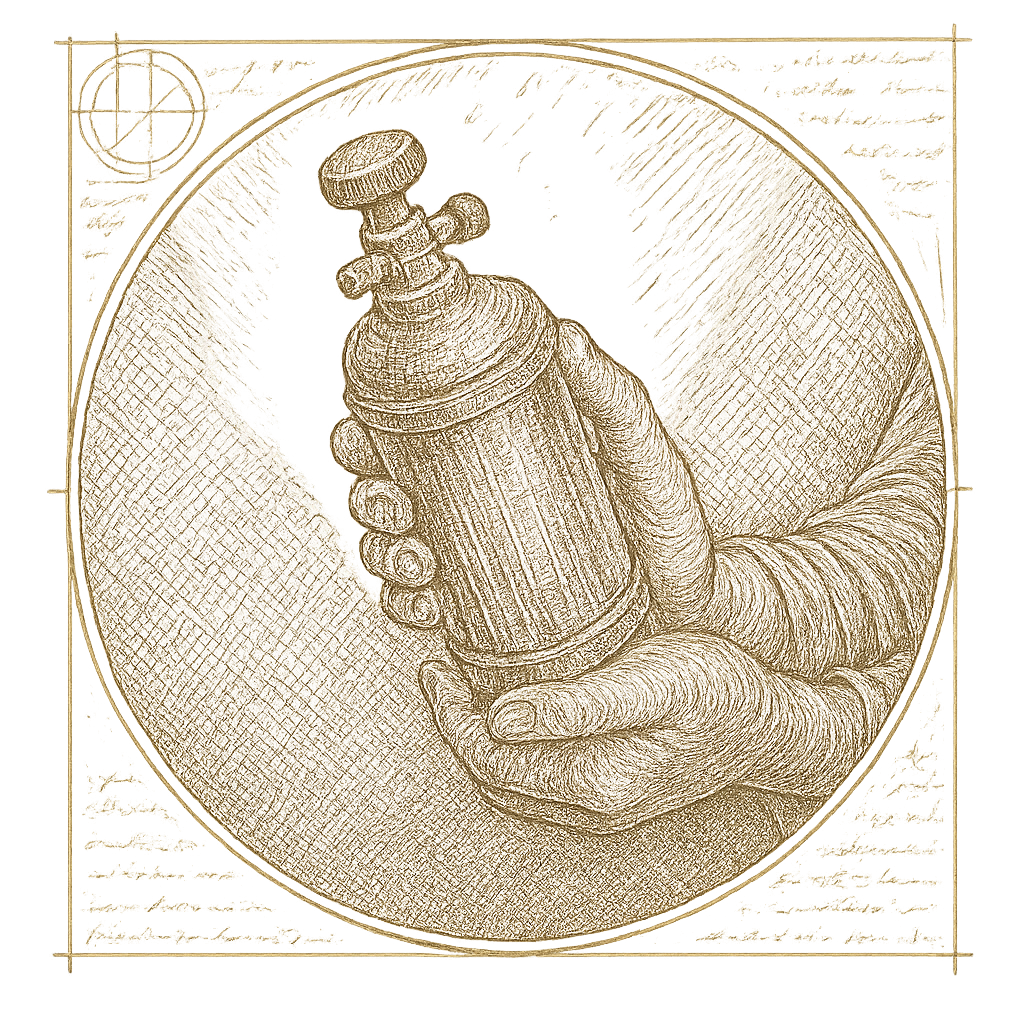The President’s Choice
President Adrian Cross had been walking the same stretch of White House corridor for three hours, his footsteps marking time with the sort of metronomic precision that suggested a man trying to outpace his own thoughts - though thoughts, unlike Secret Service agents, had proven remarkably persistent in their pursuit.
The folder under his arm contained forty-seven pages of scientific miracle wrapped in bureaucratic language, complete with charts that made human genetic modification look as routine as adjusting a thermostat. Dr. Helena Voss and her team at Helix Dynamics had done something remarkable: they'd made playing God sound like sensible public policy.
"Germline modification technology has achieved clinical readiness," the executive summary cheerfully announced, as if announcing the completion of a highway project rather than humanity's potential evolutionary fork in the road. "Full deployment could eliminate 7,000 genetic diseases within a generation, saving an estimated $2.3 trillion in healthcare costs while preventing incalculable human suffering."
Cross paused before Lincoln's portrait - Honest Abe staring down with that peculiar mixture of melancholy and determination that came from making decisions during existential crises. Though Lincoln had only dealt with preserving the Union, not redesigning the species. Rather simpler times, really.
His daughter Emma's face flickered through his mind - pale from another cardiac episode, clutching her stuffed elephant while doctors explained why her heart insisted on beating irregularly. The technology folder promised such problems would become historical curiosities, like polio or smallpox. No more children born with time bombs in their chromosomes, no more families bankrupted by genetic lottery losses.
But the same technology that could fix Emma's heart could also enhance intelligence by thirty percent, add six inches of height, improve muscle fiber efficiency, sharpen memory retention to near-photographic levels. Dr. Voss had been refreshingly honest about the implications: "The distinction between therapy and enhancement, Mr. President, is largely philosophical. Both involve deliberate genetic modification."
Cross resumed his restless pacing, passing portraits of presidents who'd faced their own species-defining moments. Washington establishing precedents, Jefferson authorizing westward expansion, Roosevelt splitting atoms. Though none of them had been asked to literally redesign human nature with the stroke of a pen.
The economic projections were particularly sobering. Within two decades, "enhanced" children would dominate academic competitions, athletic records, professional examinations. The unmodified would become a permanent underclass - not through malice, but through simple biological obsolescence. Democracy assumed rough equality among citizens; what happened when some citizens were objectively, measurably superior to others?
"Every citizen will have the same shot at life," Cross had promised during his campaign, though he'd been thinking about education funding and healthcare access, not genetic engineering. The irony was almost artistic in its completeness: he could guarantee equal opportunity by making everyone unequal, or preserve equality by condemning the genetically unlucky to lives of preventable suffering.
His chief of staff had diplomatically suggested that perhaps such decisions were "above the presidential pay grade" - though Cross rather suspected that if presidents weren't meant to decide humanity's evolutionary trajectory, the job description needed significant revision.
Was genetic modification playing God, or was refusing to use such technology a form of divine neglect? If humans had been granted the ability to eliminate genetic diseases, wasn't using that ability a moral imperative? Or was Cross about to fracture the human species into castes that would make historical class systems look quaint by comparison?
He found himself in the Oval Office, though he couldn't remember walking there. The folder lay open on his desk, authorization forms arranged with bureaucratic efficiency. One signature would launch humanity's next evolutionary phase. No signature would preserve the current genetic status quo, complete with all its beautiful imperfections and tragic lottery losses.
Cross thought of playground memories - the universal childhood experience of being picked last, or first, or somewhere in between, based on natural talent and random chance. Soon, such experiences would be obsolete. Parents would simply purchase athletic prowess along with intelligence upgrades and disease immunity, the way previous generations had bought private school educations.
His pen felt unreasonably heavy as he lifted it, as if gravity itself were protesting this moment of species-defining choice. Somewhere in hospitals across the nation, children with genetic diseases were fighting battles they couldn't win against opponents coded into their DNA. Somewhere else, families were saving money to ensure their future children would never face such battles - creating a world where genetic advantage became just another luxury item.
The authorization line waited, empty and patient as time itself.
Cross stared at the space where his signature belonged and realized he wasn't just authorizing a medical program—he was deciding whether humanity's future would be written by evolution or engineering, chance or choice, natural selection or parental selection.
Cross stared at the space where his signature belonged and realized he wasn't just authorizing a medical program—he was deciding whether humanity's future would be written by evolution or engineering, chance or choice, natural selection or parental selection.
The silence in the Oval Office stretched like held breath. Outside, Washington slept, unaware that their president sat alone in the dark, holding the future of the species in his trembling hand.
The pen hovered over empty space, poised between worlds.
No Man’s Land
The shells had been falling for three hours when Private Mills discovered that terror, like everything else in the war, eventually became routine. A disappointing development, really, since routine terror was considerably less exciting than the fresh variety and equally fatal.
"They're getting closer," observed Sergeant Davies with professional calm. The next explosion confirmed his assessment.
Davies adjusted his position with the casual efficiency of a man who'd been dodging high explosives for eighteen months. Mills, at six weeks in France, was still operating on raw nerves and maternal correspondence about neighborhood cats - amateur form, really, though enthusiasm counted for something.
"Here they come," Davies announced, as if calling the start of a particularly violent sporting match.
The flamethrowers advanced across no man's land like mechanical dragons with excellent timing and poor manners. Mills had always imagined fire as orange and cheerful - campfire fire, birthday candle fire. This fire burned with professional malice and the sort of thorough competence that left no room for survivors.
"Masks," Davies commanded, his voice already muffled by gas protection that made him resemble a militaristic insect.
Mills fumbled with his equipment, hands shaking from concussive shell-shock rather than fear - he'd graduated beyond fear into that crystalline calm that accompanies accepting one's immediate conversion to charcoal. The mask sealed with a soft hiss, transforming the battlefield into something viewed through dirty spectacles while breathing recycled panic.
The liquid fire swept methodically closer: sandbags incinerated, supply wagons vaporized, various unidentifiable objects transformed into brief, bright memories.
"Well," said Davies, voice barely audible through mask and mayhem, "this promises to be either spectacularly dramatic or disappointingly brief."
Mills gripped his rifle with the desperate intensity of a man clutching good luck charms, though rifles were notably ineffective against liquid fire and good luck had been in short supply since 1914.
The flames reached their trench with a sound like judgment day clearing its throat.
"Gentlemen," Davies announced with dinner-party courtesy, "it's been educational."
The Immortal Quota
The letter arrived on Maya's seventeenth birthday, which was either the most wonderful coincidence in human history or the most terrible - though given the Immortal Selection Committee's fondness for dramatic timing, she rather suspected the latter. The envelope bore the distinctive silver seal that made grown adults weep with either joy or despair, depending on whether it contained congratulations or condolences.
"Well?" asked her mother, hovering with the sort of anxious energy typically reserved for parents watching their children take final exams or perform in school plays. Though this was rather more consequential than either, involving as it did the small matter of living forever versus the considerably more common alternative of aging, dying, and becoming compost.
Maya opened the envelope with hands that trembled only slightly - a remarkable display of composure, considering that the contents would determine whether she had roughly sixty years left to live or several million. The Committee had thoughtfully printed the results in large, friendly letters, as if announcing eternal life were no more significant than acceptance to university.
"Congratulations," she read aloud. "You have been selected for the Immortality Program. Please report to Processing Center Seven tomorrow at 9 AM sharp. Tardiness will result in forfeiture of your slot and immediate reassignment to Mortality Track B."
Her mother burst into tears - whether of joy or terror remained unclear, though Maya suspected it was probably both. The neighbors would be positively insufferable once word got out. Mrs. Chen next door had been practically vibrating with competitive energy since her own daughter had been passed over last spring, and the Immortal Quota of three per district meant Maya's selection was someone else's devastating disappointment.
The mathematics were elegantly simple and brutally unfair: every year, exactly 30,000 seventeen-year-olds worldwide received the injection that would stop their cellular aging at its peak moment. Everyone else got a lovely consolation letter thanking them for their participation in the selection process and wishing them well in their "traditional life journey" - bureaucratic language for growing old and dying like humans had been doing for millennia before science had made mortality optional for the lucky few.
Maya's phone buzzed incessantly - news traveled fast in a world where immortality was announced via mail service. Congratulations mixed with barely concealed envy from friends who were trying very hard to be happy for her while simultaneously calculating their own dwindling odds for next year's quota.
But mixed among the well-wishes were messages of a different sort. Anonymous numbers. Terse warnings. "They're coming." "Run." "Trust no one." Which seemed rather dramatic, though Maya supposed that when one had just been granted eternal life, drama was perhaps inevitable.
The first attempt came during lunch.
Maya had been examining her immortality paperwork (a surprisingly thick stack that included dietary recommendations, exercise requirements, and stern warnings about the psychological challenges of watching everyone you know eventually die) when someone bumped into her table at the café. Just a clumsy accident - except for the syringe that clattered to the floor, its needle glinting with something that probably wasn't vitamins.
The woman apologized profusely and hurried away before Maya could get a proper look at her face. But not before Maya noticed the small pin on her jacket: a skull with wings, the symbol of the Mortal Liberation Front. A group that believed immortality should belong to everyone or no one - and had developed creative ways of ensuring the latter outcome when the former proved impossible.
The second attempt was more direct. Someone had broken into her house while she was at school, though they'd been disappointingly subtle about it - no dramatic ransacking, just the sort of careful searching that suggested professional interest in her continued mortality. They'd left behind a note tucked under her pillow: "The quota is a lie. They choose who lives and who dies. Join us or join them."
Which was rather philosophical for a death threat, Maya thought. Though she supposed people facing eternal mortality had time to craft their ultimatums with proper dramatic weight.
Her mother suggested calling the police, though the police had developed a curious tendency to be unavailable whenever immortality-related crimes occurred. The Immortal Protection Division, meanwhile, had assured her that such incidents were "vanishingly rare" and "nothing to worry about" - though they'd said this while posting armed guards outside her school, which rather undermined their reassurances.
Maya found herself in the peculiar position of being simultaneously the luckiest and most endangered teenager in her district. Tomorrow she would receive the injection that would make her biologically seventeen forever - assuming, of course, that she lived long enough to reach the appointment.
She sat in her bedroom that evening, surrounded by immortality paperwork and anonymous threats, watching the sun set on what might be either her last day of mortality or her last day of breathing. The irony was almost beautiful in its completeness: granted eternal life, she had perhaps twelve hours left to enjoy it.
Her phone buzzed one final time. A new number, a simple message: "Door. Now."
Maya looked toward her bedroom window, then at the packet of immortality pills she was supposed to begin taking immediately. Outside, footsteps approached with the careful rhythm of people who had all the time in the world to get their job done properly.
She pocketed the pills, grabbed her jacket, and headed for the back door, wondering if immortality was worth living long enough to experience.
The Cave
"Well," said Marcus, his breath forming small clouds in the bitter air, "this is cozy."
Elena's glare could have melted steel - though unfortunately for their present circumstances, looks possessed no measurable thermal properties, and the cave remained stubbornly, viciously cold. She said nothing, which was perhaps more ominous than any verbal response could have been.
Marcus busied himself with the collection of half-frozen twigs they'd managed to salvage - a pathetic arsenal against the elements, though one learned to appreciate such small mercies when the alternative was dying of exposure before dawn. The silence stretched between them like a taut wire, punctuated only by the wind's howling commentary on their situation.
"Catastrophically inconvenient," Elena said finally, her voice carrying the sort of precision that suggested she'd been testing various phrases in her mind and settled on this one as most accurate.
"Is that what we're calling it?" Marcus struck the flint with hands that shook only slightly - whether from cold or something else entirely was a matter he preferred not to examine too closely. The spark caught, flared, died. He tried again. "I might have chosen different words."
"I'm sure you might have." Elena moved closer to their potential fire with the careful dignity of someone pretending that dignity still mattered when one was hiding in a cave like a common criminal. "Though your usual vocabulary in these situations tends toward expressions that would have made my governess reach for her smelling salts."
The second spark held. A small flame bloomed between them, casting restless shadows that seemed to dance with entirely too much enthusiasm for their grim circumstances. Marcus fed it another twig with the sort of careful attention that suggested this skill hadn't been acquired in any respectable educational institution.
"At least we're not dead," he offered, though his tone suggested he was still calculating the odds on that particular outcome.
"The night is remarkably young," Elena replied, settling beside the fire with evident relief. "And our friends have proven themselves nothing if not... thorough."
Friends. Such an interesting choice of words for people who were undoubtedly, at this very moment, discussing the most efficient methods for ensuring their permanent silence. Marcus added another branch to their small rebellion against the darkness. "I prefer to think of them as enthusiastically concerned with our wellbeing."
"Enthusiastically concerned enough to follow us into a blizzard."
"Touching, really. Such dedication to... friendship."
Elena made a sound that might have been laughter or might have been something altogether more bitter. "Do you suppose they're out there now? Trudging through the snow with their touching concern?"
Marcus considered this while contemplating the fire that stood between them and a rather final sort of sleep. "I imagine they're having tea by a warm fire, discussing the weather and waiting for morning to collect whatever's left of us."
"How civilized of them."
"Civilization," Marcus observed, "has always been their particular strength."
They lapsed into a comfortable silence, both mesmerized by the hypnotic dance of flames that had transformed their desperate refuge into something approaching sanctuary. The fire crackled and whispered its ancient secrets, filling their small world with the primal comfort that had warmed humanity's earliest ancestors. Elena found herself drowsing slightly in the blessed heat, her body finally beginning to thaw as the warmth seeped through her clothes and into her bones. The cave walls, no longer hostile stone but gentle guardians painted gold and amber by their faithful flame, seemed to wrap around them like protective arms.
Shadow School
Liora had been talking to her shadow for as long as she could remember - though "talking" implied a conversation, and shadows, being properly educated at the Academy, never talked back.
They did other things, of course. When she felt sad (an emotion that arrived in careful, measured doses, pre-approved by the Department of Emotional Regulation), her shadow would pat her shoulder. When she was frightened during thunderstorms, it would hold her hand with fingers that felt like cool silk. When she laughed-those brief, bright moments before remembering that excessive joy was unseemly-her shadow would clap its hands together in delight.
A perfect companion, really. Responsive but never demanding, present but never intrusive, emotional but never overwhelming. Everything a properly disciplined shadow should be.
This morning, Liora had whispered her usual greeting: "Good morning, Shadow." She'd been doing this since she was small, despite Mother's gentle corrections that shadows were not pets to be addressed directly. But her shadow had always responded with a cheerful wave, a little bow, sometimes even what appeared to be a curtsy.
Today, nothing.
She tried again, louder this time. "Shadow?" Her reflection remained perfectly still against the bedroom wall - not the warm stillness of patient attention, but the cold stillness of absence. Like looking at a photograph of herself rather than a living extension of her being.
At breakfast, she deliberately knocked over her juice glass (a shocking breach of table manners that would normally have sent her shadow into apologetic fits of handwringing). Her shadow merely mimicked the motion exactly-no embarrassment, no personality, no... there-ness.
"Mother," Liora said carefully, "what happens to shadows at the Academy?"
Mother's smile had that particular quality that all adult smiles possessed when discussing shadow-related matters-bright and empty as a newly cleaned window. "They learn proper behavior, darling. Discipline. Order. They become the companions you need them to be."
"But what if-" Liora began, then stopped. How did one explain that one's shadow had been replaced by a perfect stranger wearing its shape?
At school, she watched the other children's shadows with new attention. Marcus Chen's shadow sat with its hands folded precisely as Marcus did, never fidgeting, never showing the restless energy that had once made it drum its fingers during boring lessons. Sarah Kim's shadow no longer tried to catch dust motes in sunbeams-it simply existed, a dark mirror with no will of its own.
When had they all changed? How long had she been the only one still accompanied by a shadow with thoughts and feelings and delightful small rebellions?
And now, apparently, she wasn't.
The bronze bells began their evening song, and Liora's shadow detached itself with mechanical precision - no lingering goodbye, no backward glance, no acknowledgment of twelve years of whispered conversations and shared secrets. It simply... left, marching away with all the other perfectly trained shadows toward another night of lessons that would ensure tomorrow's compliance.
Liora stood alone in her bedroom, shadowless and somehow lighter - the way one might feel after losing a limb, she imagined. Empty. Unbalanced.
But also, for the first time in her life, utterly alone with her own emotions-emotions that crashed over her in waves she had no idea how to navigate. No shadow to siphon off her sadness, to metabolize her anxiety, to bear the exhausting weight of feeling. Just Liora, drowning in sensations she'd never had to process alone, burning with grief that had nowhere to go but deeper into her own chest.
She looked in the mirror and saw only herself - no dancing companion, no silent confidant, no other half to make her whole. Just a twelve-year-old girl with tears streaming down her face, experiencing grief in its full, terrible intensity for the first time in her life.
Her shadow had graduated, she realized with the cold clarity that comes with loss. It had learned its final lesson at the Academy: how to stop being hers entirely.
But as Liora stood there, drowning in emotions she'd never learned to swim in, something else began to surface through the overwhelming tide of feeling. Something that felt almost like... hunger. A wild, desperate need to understand what had been taken from her, from all of them.
Outside her window, the bronze bells fell silent. The perfectly ordered streets of Luminspire stretched into darkness, every citizen tucked safely away with their newly disciplined shadows. Every citizen except those whose shadows had vanished entirely - people her mother warned her never to speak to, who walked the night hours with strange, unsteady gaits and eyes that burned too bright.
Liora wiped her tears with shaking hands and walked to her bedroom door.
For the first time in her life, she was going to break curfew.
The hallway stretched before her like an invitation to chaos, and Liora Chen—drowning, burning, gloriously, terrifyingly alive with her own untamed emotions - stepped into it.
Market Value
The numbers floating above Maya's head possessed that peculiar combination of cheerfulness and menace that only a computer could achieve:
Market Value: 847,932
Her number, the number rather, pulsed in friendly green digits, as if congratulating her on being worth nearly a million credits. Pretty good. Whether this was something to celebrate depended on one's views regarding slavery with excellent dental coverage.
"Nexus Corp opens at eight-forty," declared the auctioneer with the kind of professional enthusiasm generally reserved for cattle shows, though cattle, one imagined, were treated with considerably more sentiment.
Maya's bio-cuffs purred against her wrists like mechanical pets, measuring everything from her resting heart rate to yesterday's fiber intake. The amphitheater spread before them in magnificent corporate splendor - tier upon tier of polished executives clutching tablets, their eyes bright with the particular hunger that comes from shopping for other people's children. Progress, they called it, though the ancients might have used a different word entirely.
"DataFlow Industries, eight-fifty-five thousand."
Poor Marcus to her left sniffled softly, his 312,000 valuation blinking like a distress signal. Mining colonies beckoned for boys like Marcus - places where the air tasted of copper and dreams went to die quietly. Meanwhile Jin, blessed with the sort of genetic lottery that made biotech executives weep tears of joy, stood radiating the calm of the naturally valuable. His 1.2 million glowed like a halo.
"Nexus at eight-seventy."
Maya had spent three years of her life becoming precisely the sort of commodity these people desired - learning Mandarin at four AM, perfecting her neural response times, consuming nutrients with the dedication of a monk pursuing enlightenment. All to avoid the gray sprawls where workers forgot their names with remarkable efficiency. One did what one must, even when what one must was fundamentally absurd.
"DataFlow, nine hundred thousand."
The algorithms found something delicious in her biometrics - perhaps her carefully controlled terror, or that stubborn flicker of hope that humans carried even to their own executions. The corps did so appreciate fresh data, especially when it came wrapped in flesh that could think and suffer in interesting ways.
"Going once-"
Then, with the dramatic timing that suggested either divine intervention or very sophisticated planning, the lights expired.
Maya's bio-cuffs died with them, which felt rather like having one's pulse suddenly declared non-existent by bureaucratic decree. Delightful chaos ensued- sirens wailing their electronic anguish, distinguished executives bumping into furniture.
Something cold and precise kissed her neck.
Not a hand, her increasingly detached mind observed, but metal of the medical variety. The sort of thing designed by people who understood that the human body for what it truly was - a mere collection of systems to be efficiently managed. The paralytic worked with the quiet competence of good engineering, folding her legs beneath her as neatly as closing a book.
Strong arms gathered her up before gravity could claim its due - no speeches, no revolutionary rhetoric, just the sort of professional courtesy one might show a valuable package requiring careful handling.
When the emergency lighting finally decided to cooperate, the assembled buyers found themselves contemplating empty air where 847,932 credits of meticulously cultivated human potential had recently stood.
What a rather shame. One imagined they found this development less than satisfactory. After all, even the most carefully calculated market occasionally experiences what economists, in their absolute-and-infinite wisdom, call "unexpected volatility."
And this was it’s black swan event.
Final Whistle
"-still talking about the Rome match," Dieter says, unlacing his boots.
Klaus doesn't answer. The envelope sits on the bench between them, brown paper that arrived during warm-ups. Official seal. He's been staring at it for twelve minutes.
"Open the damned thing."
Klaus tears the paper. Scans typed lines that reorganize his life into military coordinates. Report to Kaserne Dachau. 0600 hours.
"Christ," Dieter whispers.
Through the dressing room walls, crowd noise builds toward kickoff. Eighty thousand voices that don't know their striker just became infantry. Klaus folds the conscription order, tucks it into his kit bag next to boots he'll never wear again.
"The exemption-"
"Expired." Klaus stands, pulls his jersey over his head. "August thirty-first."
Dieter kicks his locker. "Bastards waited until the season started."
Klaus changes into street clothes with mechanical precision. The uniform hanging in his locker-red and white stripes, number 9-stays on its hook like skin he's shed. Someone else will wear it tomorrow. Some kid from the reserves who dreamed of this moment before the war made dreams into casualties.
"Manager knows?"
"Manager's the one who handed me the envelope."
Outside, the referee's whistle signals teams taking the field. Klaus recognizes the crowd's shift-anticipation building toward that moment when players emerge from the tunnel like gladiators entering an arena that belongs to them completely.
Belonged to him, past tense.
Dieter grabs his shoulder. "Run."
"Where?"
"Switzerland. France. Anywhere that isn't here."
Klaus almost laughs. "With what papers? What money?" He gestures toward the window where searchlights sweep autumn sky. "They're watching the borders now. Watching everything."
The crowd roars. Match beginning without him, formation adjusted around the hole where Klaus Hoffmann used to exist. His replacement-Weber, nineteen, too eager-will try to fill spaces that can't be filled, play a position that no longer exists in any meaningful way.
Klaus picks up his bag. Leaves the locker open, jersey hanging like a flag of surrender.
"This isn't over," Dieter says.
"This is exactly over."
Klaus walks toward the exit where his father waits beside a black sedan, engine running.
NEW SINGLE TOMORROW - ‘Inside My Mind’
so a new track is coming to all good music stores including spotify and apple music and deezer if anyone actually uses that on friday its called inside my mind and its built on this super minimal groove soft syncopated percussion deep pulsing bass and airy synth pads that float around your headphones gentle keys slip in to give it that dreamy bittersweet late night feel and its moody and its hypnotic and its the kind of track you can get lost in on repeat and this is just the start im dropping a brand new single every friday forever so if you like the vibe stick around you can preview the song just above this paragraph when people start reading this blog i might start using proper grammar thanks
-BJR
Bridge Traffic
"New batch this week," Sam says, nodding toward the glass.
Elena adjusts her briefcase strap, eyes forward. "Don't look."
But everyone looks. That's the point. The bridge between Central Station and Meridian Tower serves as the city's primary commuter route, and the prisoners line both sides like living exhibits, IV drips snaking from their arms to overhead rails that follow the walkway's curve.
They wear standard-issue gray. Sit in regulation chairs. Stare at nothing while commuters stream past on their way to meetings and lunch appointments. The morning rush provides optimal viewing hours - 8:47 AM, according to Elena's phone. Peak traffic.
"That one's been here since spring," Sam whispers, indicating a woman whose drip bag hangs nearly empty. "Heard she was some kind of journalist."
Elena catalogues her automatically. Female, middle-aged, sedated but responsive. The placard reads Financial Crimes - Municipal Fraud. Standard classification for journalists who exceeded their reporting parameters.
The subject sits upright, pupils tracking movement with the sluggish attention of properly medicated specimens. Her drip rate runs at regulation intervals - calibrated to maintain compliance without rendering the display unconscious. Functional dependency.
"They could leave anytime," Sam says.
"Sure they could."
Elena knows the withdrawal protocols. Forty-eight hours of systematic agony, followed by weeks of neurochemical chaos that makes basic functioning impossible. The city provides rehabilitation programs, but the waiting list stretches eighteen months. Most prisoners check themselves back in after three days clean.
A businessman checks his watch, glancing at the display with the casual interest of someone examining store windows. Below them, trains arrive and depart with mechanical precision, carrying passengers who never see the bridge's underside where waste lines and electrical conduits service the exhibition space.
Sarah's drip bag empties with a soft click. A maintenance worker appears immediately, wheeling a cart of fresh supplies. He changes the bag with practiced efficiency, then moves to the next prisoner - an older man Elena doesn't recognize, gray-haired and hollow-eyed, IV line disappearing into his sleeve.
"Wonder what he did," Sam murmurs.
Elena doesn't wonder. The bridge serves multiple functions: deterrent, entertainment, waste management. Maximum efficiency.
They reach the station entrance. The 9:15 to Ashford idles at the platform.
Credit Limit
The collar tightens at 6 AM. Oxygen ration expired.
Maya's throat constricts against regulation steel, the filtration device calculating her remaining breath in digital increments that tick downward like a countdown to suffocation. Twelve minutes. Eleven. Ten.
She checks her credit balance through cracked phone glass: negative forty-seven units. Yesterday's panic attack cost her three days' worth of clean air, hyperventilation treated as luxury consumption by algorithms that don't account for grief.
Outside her window, smog hangs like wet concrete. Children press faces against classroom glass, drawing pictures of something called "blue sky" from textbook descriptions they've never verified. The sun exists as theory now—a heat source filtered through atmospheric soup thick enough to chew.
Maya's neighbor coughs through paper-thin walls. Mrs. Chen, ninety-three, collar silent for two days running. The old woman's breathing sounds like gravel shifting in a tin can, rationed air whistling through lungs that remember when oxygen was free.
Nine minutes.
Maya opens her dresser drawer. Behind folded shirts, a breath tank the size of a thermos gleams like contraband silver. Black market. Five thousand credits on the underground exchange. One hour of unfiltered air that tastes like memory—or what memory would taste like if anyone could remember breathing without meters.
The tank's valve turns with the precision of a prayer wheel. Clean air hisses into her collar's reservoir, resetting the countdown, buying time measured in respiratory cycles.
Her phone buzzes. Text from unknown number: Vault opens tonight. Corner of Fifth and Ash. Bring wire cutters.
The old greenhouse project. Pre-collapse biodome that supposedly holds enough oxygen to flood six city blocks. Maya knows the stories—sealed atmosphere from before the wars, when trees grew wild and unmetered, when breath was human birthright instead of state commodity.
Eight minutes. Fresh tank or not, the collar's sensors detect unauthorized supplements. Penalty breathing. Maya's throat burns as the device adjusts compression ratios, teaching her body to want less, need less, survive on chemical substitutes that taste like copper and defeat.
She deletes the text.
Opens the window. Smog rolls in like dirty water, carrying traces of industrial processing plants and the particular sweetness of human desperation. Somewhere in the gray distance, oxygen harvesters spin their mechanical prayers, converting atmospheric poison into rationed salvation one cubic meter at a time.
Maya checks her balance again. Six minutes.
The breath tank sits on her dresser, silver and patient, holding enough stolen air to last until tomorrow's ration reset. She could stretch it. Make it last. Live one more day as a measured woman in a metered world.
Or she could empty it now. Flood her lungs with borrowed breath and walk toward Fifth and Ash, where wire cutters wait and greenhouses dream of opening like massive lungs, exhaling decades of hoarded atmosphere into a city that's forgotten how to breathe free.
The collar counts down. Five minutes.
Maya reaches for her coat.

